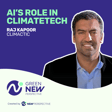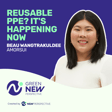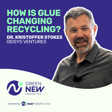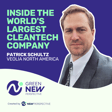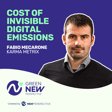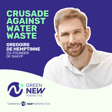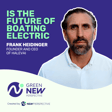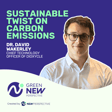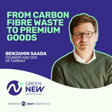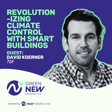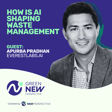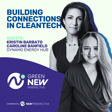
Inside New York's Longest-Running Climate Tech Incubator
In this episode, Jeanette Williams and Frederic Clerc from the Urban Future Lab discuss their mission to support climate tech startups. They share insights on the challenges faced by these startups, the importance of customer discovery, and the role of incubators in fostering innovation.
The conversation also touches on the significance of equity in climate tech, communication barriers, scalling challenges, and the future of climate innovation, particularly in New York City.
Guests:
Jeannette Williams, Chief Operating Officer
Frederic Clerc, Interim Managing Director
Key Takeaways:
━━━━━━━━━━━━━
➜ Urban Future Lab is the longest climate tech incubator in NYC.
➜ They have supported over 170 startups since 2009.
➜ Customer discovery is crucial for startup success.
➜ Successful startups leverage incubators for connections.
➜ Startups must consider environmental impacts of their innovations.
➜ Communication gaps hinder climate tech accessibility.
➜ Adaptation to climate change is an underserved area for innovation.
➜ New York offers a robust market for scaling climate tech.
➜ Equity and inclusion are vital in climate tech initiatives.
➜ The future of climate tech relies on collaboration and innovation.
📚 Follow UFL:
━━━━━━━━━━━━━━
- Website: https://www.ufl.nyc
- LinkedIn: https://www.linkedin.com/company/urban-future-lab/
- Instagram: https://www.instagram.com/urbanfuturelab
- Newsletter: https://bit.ly/ufl-newsletter
🎧 Subscribe to our podcast:
━━━━━━━━━━━━━
- Spotify: https://bit.ly/3PSWIyI
- Apple Podcasts: https://bit.ly/3RvlHte
- Youtube: https://bit.ly/3RDzkXg
- Deezer: https://bit.ly/3PvQaof
- Amazon Music: https://bit.ly/3PQlijS
- Zencastr: https://bit.ly/48xt75s
💬 Follow GNP podcast on social media:
━━━━━━━━━━━━━
- Instagram: https://www.instagram.com/greennewperspective/
- LinkedIn: https://www.linkedin.com/company/new-perspective-marketing/
- Facebook: https://www.facebook.com/greennewperspective
- TikTok: https://www.tiktok.com/@greennewperspective
🌍 Cleantech marketing podcast created by New Perspective
━━━━━━━━━━━━━━━━━━━━━━━━━━━
This podcast is proudly created by New Perspective Marketing, a dynamic growth marketing agency in Boston, MA, celebrating 20 years in business. We help sustainably focused B2B organizations grow their brands and scale up revenue. If you or your organization is looking to grow, visit https://www.npws.com for more info.
#Sustainability #Cleantech #podcast #GreenNewPerspective
Host & Co-Producer: Dunja Jovanovic
Executive Producer: Marko Bodiroza


